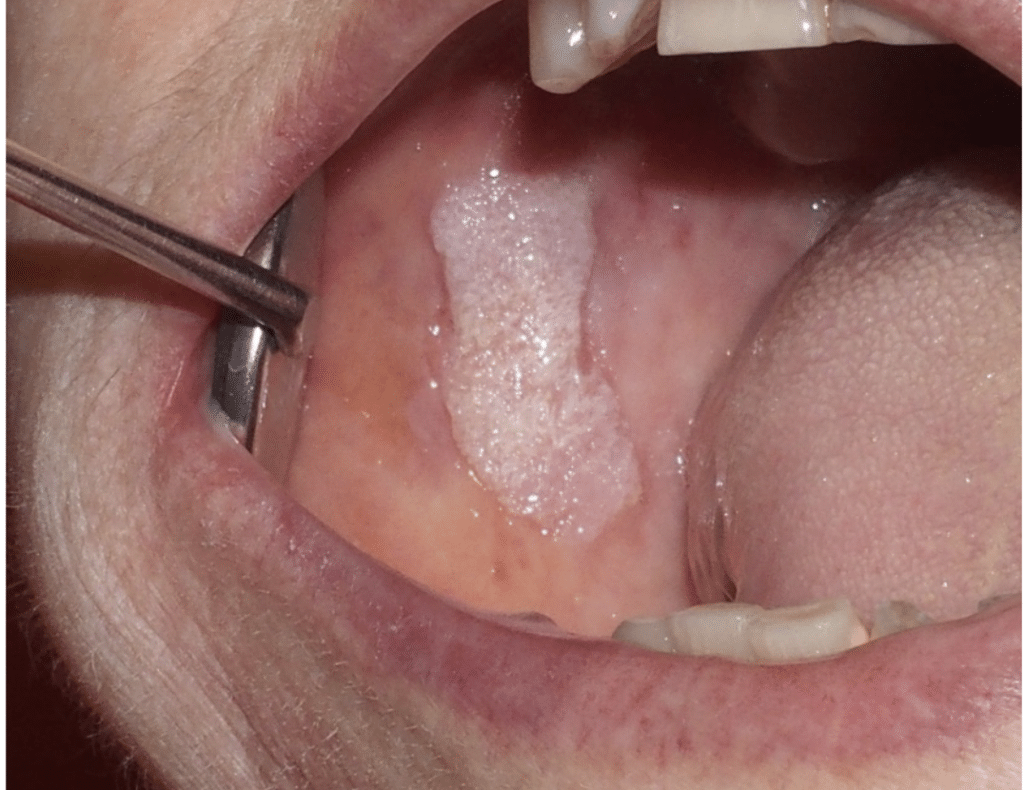Table of Contents

Indications for Buccal Cancer Surgery
The most common indication for buccal cancer surgery is the presence of a tumor in the buccal mucosa that has been confirmed as cancerous. In some cases, surgery may be recommended even if the tumor is not cancerous, but it is causing pain or discomfort, or if there is concern that it could develop into cancer in the future. Additionally, if the cancer has spread to nearby lymph nodes, surgery may be necessary to remove the affected lymph nodes.
Procedure
Buccal cancer surgery is typically performed under general anesthesia, which means that the patient is asleep during the procedure. The procedure involves making an incision in the cheek to gain access to the tumor. The tumor and any affected tissue or lymph nodes are carefully dissected and removed from the surrounding tissue. The incision is then closed with sutures or staples.
In some cases, if the tumor is large or located close to important structures such as nerves or blood vessels, the surgeon may use a more complex technique such as reconstructive surgery to restore the appearance and function of the affected area.
Recovery
After the procedure, the patient will be monitored in the recovery room until they are fully awake and stable. Most patients will need to stay in the hospital for a few days for observation and to manage pain and other symptoms. After leaving the hospital, patients will need to follow a strict regimen of oral care to promote healing and reduce the risk of infection.
Recovery time varies, but most people can return to normal activities within a few weeks after the procedure. Common side effects after surgery include pain, swelling, and bruising in the affected area. Pain can typically be managed with over-the-counter pain medication or prescription pain medication if necessary.
Risks
As with any surgery, buccal cancer surgery carries some risks, such as bleeding, infection, and complications related to anesthesia. Bleeding is the most common complication, and it can occur up to two weeks after the surgery. In some cases, bleeding may require a return trip to the operating room.
Infection is another potential risk of buccal cancer surgery. Antibiotics may be prescribed after the surgery to reduce the risk of infection. Complications related to anesthesia, such as a reaction to the medication, are rare but can occur.
Benefits
Buccal cancer surgery has several benefits, particularly in cases where the tumor is causing pain or discomfort, or if there is concern that it could develop into a more serious condition. Removing the tumor can also improve the appearance of the affected area and restore normal function, such as the ability to speak or eat.
Additionally, if the cancer has spread to nearby lymph nodes, removing the affected lymph nodes can help to prevent the cancer from spreading further and improve the chances of a positive outcome.
Conclusion
Buccal cancer surgery is a common surgical procedure that is typically performed to remove cancerous tumors in the buccal mucosa or nearby lymph nodes. While there are risks associated with the procedure, the benefits of buccal cancer surgery can be significant, particularly in cases where the tumor is causing pain or discomfort or if there is concern that it could develop into a more serious condition. If you are considering buccal cancer surgery , it is important to discuss the risks and benefits of the procedure with a qualified healthcare provider, and to consider the potential costs and insurance coverage.
Adjuvant Treatment of the Buccal Cancer
Buccal cancer is a type of oral cancer that develops in the lining of the cheeks or buccal mucosa. While surgery is often the primary treatment for buccal cancer, adjuvant treatments such as radiation therapy or chemotherapy may also be used to improve the chances of a positive outcome. In this article, we will provide an in-depth look at adjuvant treatment for buccal cancer, including the indications for treatment, the types of adjuvant treatment available, and the potential risks and benefits.
Indications for Adjuvant Treatment
Adjuvant treatment for buccal cancer is typically recommended if there is a high risk of the cancer returning or spreading after surgery. This may be the case if the cancer is large or has spread to nearby lymph nodes, or if the cancer is located in a difficult-to-treat area.
Types of Adjuvant Treatment
The most common types of adjuvant treatment for buccal cancer are radiation therapy and chemotherapy.
Radiation therapy involves the use of high-energy radiation to kill cancer cells. It can be administered externally, using a machine that directs radiation beams at the affected area, or internally, using radioactive implants or pellets that are placed near the tumor. Radiation therapy is often used in combination with surgery to kill any remaining cancer cells that may have been left behind.
Chemotherapy involves the use of drugs to kill cancer cells. It is typically administered intravenously, but it can also be taken orally or topically. Chemotherapy may be used alone or in combination with radiation therapy, depending on the individual patient’s needs.
Potential Risks and Benefits
Adjuvant treatment for buccal cancer carries some risks, such as damage to healthy tissue, side effects from chemotherapy, and complications related to anesthesia. However, the potential benefits of adjuvant treatment can be significant, particularly in cases where the cancer is aggressive or has a high risk of recurrence.
The use of adjuvant treatment can improve the chances of a positive outcome, such as a reduction in the size of the tumor or the elimination of any remaining cancer cells. Adjuvant treatment can also help to prevent the cancer from spreading further and can improve the overall quality of life for the patient.
Conclusion
Adjuvant treatment is a common treatment option for buccal cancer, particularly in cases where the cancer is aggressive or has a high risk of recurrence. The most common types of adjuvant treatment for buccal cancer are radiation therapy and chemotherapy. While adjuvant treatment carries some risks, the potential benefits can be significant, and it can improve the overall chances of a positive outcome. If you are considering adjuvant treatment for buccal cancer, it is important to discuss the potential risks and benefits with your healthcare provider to determine the best course of treatment for your individual needs.
Buccal Cancer Surgery Cost
The cost of buccal cancer surgery can vary depending on several factors, including the location of the procedure, the type of healthcare provider performing the surgery, and the individual patient’s insurance coverage. In general, the cost of buccal cancer surgery can range from a few thousand dollars to tens of thousands of dollars.
For patients with health insurance, the cost of buccal cancer surgery will depend on the type of insurance they have and the specific policy. Many insurance plans will cover all or a portion of the cost of the surgery, but patients should check with their insurance provider to determine their coverage.
For patients without insurance or with insurance that does not cover the full cost of the procedure, there are several options for managing the cost. Some healthcare providers offer payment plans or financing options to help patients pay for the surgery over time. Additionally, patients may be able to negotiate the cost of the procedure with their healthcare provider.
It is important to note that the cost of buccal cancer surgery is only one factor to consider when deciding whether to undergo the surgery. Patients should also consider the potential risks and benefits of the procedure, as well as their overall health and well-being. Patients should discuss the risks and benefits of buccal cancer surgery with their healthcare provider to determine if the procedure is right for them.
Conclusion
Buccal cancer surgery is a common surgical procedure that is typically performed to remove cancerous tumors in the buccal mucosa or nearby lymph nodes. The cost of the surgery can vary depending on several factors, including insurance coverage, location, and healthcare provider. If you are considering buccal cancer surgery, it is important to discuss the potential costs with your healthcare provider and to consider the potential risks and benefits of the procedure.
Buccal Cancer Surgery Cost in Turkey
Buccal cancer surgery in Turkey can vary in cost depending on several factors, such as the type of procedure, the location of the hospital or clinic, and the individual patient’s needs. Generally, the cost of buccal cancer surgery in Turkey is much lower compared to other countries, making it an attractive destination for medical tourists seeking high-quality medical care at a reasonable price.
The cost of buccal cancer surgery in Turkey typically includes the cost of the surgical procedure, anesthesia, and hospitalization fees. The cost may also include pre-operative consultations, post-operative follow-up care, and any necessary medications. Additionally, some hospitals or clinics in Turkey may offer packages that include transportation, accommodations, and translation services for international patients.
To give an estimate, the cost of buccal cancer surgery in Turkey can range from 6,000 to 15,000 USD. However, the cost may vary depending on the complexity of the procedure and the hospital or clinic where the surgery is performed.
It is important to note that the cost of buccal cancer surgery in Turkey is only one factor to consider when deciding whether to undergo the surgery. Patients should also consider the potential risks and benefits of the procedure, as well as their overall health and well-being. Patients should discuss the potential costs and the risks and benefits of buccal cancer surgery with their healthcare provider to determine if the procedure is right for them.
In conclusion, buccal cancer surgery in Turkey is a cost-effective option for patients seeking high-quality medical care at a reasonable price. However, patients should carefully consider the potential risks and benefits of the procedure and discuss the costs and available options with their healthcare provider. It is also important to choose a reputable hospital or clinic in Turkey that provides high-quality care and has a good reputation for treating buccal cancer.
